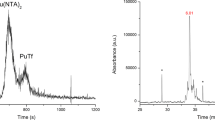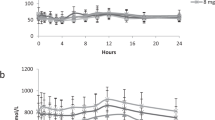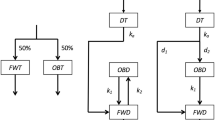Abstract
The phosphate excretion by the kidney follows different laws well determined by L. Brull1 and since confirmed by other investigators. However, the mechanism of the excretion of phosphate has not been completely explained. Thus it was considered of interest to study the mechanism of excretion of phosphate by the kidney, using radiophosphorus 3215P (The 3215P was prepared by Dr. F. A. Heyn (Philips, Eindhoven), and I am indebted to him for his co-operation and generosity.)
This is a preview of subscription content, access via your institution
Access options
Subscribe to this journal
Receive 51 print issues and online access
$199.00 per year
only $3.90 per issue
Buy this article
- Purchase on Springer Link
- Instant access to full article PDF
Prices may be subject to local taxes which are calculated during checkout
Similar content being viewed by others
References
Brull, L., C.R. Soc. Biol. 98, 325 (1928); 99, 1605 (1928). Arch. Intern. Physiol., 32, 138 (1930); Ann. Physiol., 12, 635(1936).
Author information
Authors and Affiliations
Rights and permissions
About this article
Cite this article
GOVAERTS, J. Urinary Excretion of Phosphate with 3215P as Indicator. Nature 160, 53–54 (1947). https://doi.org/10.1038/160053b0
Issue Date:
DOI: https://doi.org/10.1038/160053b0
This article is cited by
-
Gibt es eine tubuläre Phosphatsekretion? Über die Ausscheidung von anorganischem und organischem Phosphat bei der Katze
Pflüger's Archiv für die gesamte Physiologie des Menschen und der Tiere (1953)
Comments
By submitting a comment you agree to abide by our Terms and Community Guidelines. If you find something abusive or that does not comply with our terms or guidelines please flag it as inappropriate.



